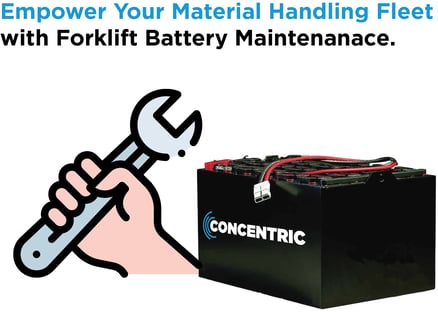
Breakdowns and unexpected downtime affecting forklift batteries and charging equipment can have devastating effects on overall material handling productivity. When any asset in this ecosystem fails, the supply chain may come to a halt — and this doesn't even account for the safety risk accompanying a sudden breakdown.
Fortunately, your organization has ways to defend against these issues and minimize the chance of suffering electric forklift battery problems. A more proactive approach to industrial battery maintenance, paired with intentional and careful charging ecosystem design, could save your business the complications associated with purely reactive repairs.
Why is Forklift Battery Maintenance So Important?
When taken together, battery and maintenance issues may represent 70% of overall forklift operational costs. The decision to buy new forklift trucks can feel like a critical budgetary move for a business, but the true total cost of ownership (TCO) for those vehicles will become clear over time. Your choices regarding maintenance and battery care can determine whether that TCO is favorable.
When a business doesn't plan for proactive forklift battery maintenance, it can encounter a number of problems. First and foremost, strictly reactive repair strategies that run equipment to failure are built on the assumption that those failures will take place. Any one of those breakdowns, however, could prove extremely costly in repair expenses and in lost productivity.
The recurring costs of a suitable proactive maintenance approach, whether run on its own or as part of a managed services battery usage program, are small in comparison to the fallout from an unexpected breakdown.
Since forklift batteries represent such a large investment, maximizing their usable life span is another high-priority consideration. Here, too, a battery maintenance program is critical. Neglecting to attend to issues as they occur is one of the key mistakes that can lessen battery life, alongside inconsistent watering and unsuitable charging.
In general, battery maintenance must be a priority because the alternative, running until failure, is more expensive and risky over time. Companies that decide to embrace reactive-only repairs as a way to save money may find themselves facing high costs, both in the short term due to unexpected breakdowns and in the long term through more frequent equipment replacement.
What's the Most Effective Approach to Battery Maintenance?
The best way to deal with forklift battery maintenance is to proactively have experts looking after the technology. A lack of skilled technicians can be a major problem with forklift operations in general.
Companies that don't employ specialists or work with consultants to take the lead on forklift issues may find they're stretching their own employees too thin, calling on material handling staff to do too much. If these professionals are split between too many responsibilities, they may fail to notice maintenance requirements until it's too late.
With dedicated staff members on call, whether these are your company's own employees or third-party experts specifically hired for power management, you can implement a proactive maintenance strategy. Regular equipment inspections paired with preventative maintenance activity can guard against unexpected failures while also giving more visibility into battery status and TCO than was previously possible.
Ideally, battery maintenance strategies will not just be added onto your material handling operations after the fact. Rather, repairs will be one element of an overall approach to power systems. If you assess exactly what your business needs in terms of battery types, number of vehicles, charging methodology, watering infrastructure and more, the resulting strategy will reflect those requirements perfectly.
After performing such an assessment, you have options. You can either staff the resulting power management approach with internal employees or assign responsibilities to third-party experts. Due to the vast range of potential material handling needs, even that model can take a few forms. Some of these include managed power services and the use of on-site technicians.
Maintenance As Part of Managed Power Services
If your organization uses at least 10 forklift trucks on two shifts or more, you can invest in managed power services, rolling all battery management duties and challenges into a simple monthly payment. This is what goes into the GuaranteedPOWER® program from Concentric.
The managed services approach rolls every part of power system design and management into one package, including maintenance and repairs. Because the system is designed from the ground up to match the organization's requirements, everything from the number of vehicles and type of batteries to the repair schedule will be built to optimize TCO and give you the lowest possible costs.
Since the expenses of maintenance and repairs become part of the monthly price of managed services, this is the most stable and predictable way to take care of forklift truck upkeep.
On-Site Third-Party Technicians
Even if you don't opt for a full-scale managed services approach to forklift power maintenance, there are options to put expert third-party technicians in your facility to deliver better uptime and reliability. This is what the GuarateedLIFT program from Concentric delivers, for example.
Working with specialized technicians allows your organization to become more proactive about maintenance, even when dealing with aging batteries, chargers or lift trucks. If you've noticed the costs of maintaining your power equipment increasing over the years, these professionals can step in to change that pattern and deliver improved uptime.
How Does Forklift Battery Maintenance Fit with Related Services?
As part of a strategic power management approach, forklift battery maintenance is just one service among many. While timely repairs are crucial in increasing usable battery life span, they're not the only activity that fits into this category.
To optimize the TCO of your electric forklift power systems, you should also make sure your industrial battery charging and battery watering systems are operating at a high level. This means everything from charger infrastructure and watering equipment to best practices has been optimized to suit your approach to battery use.
As with battery maintenance, it's unfortunately common for charging and watering to go neglected in overall material handling operations. By taking a closer look at these processes, you can give your business a competitive edge.
Battery Charging
In recent years, new charging strategies have come to the fore. The classic model of battery charging — using a battery charger room — is still relevant for some businesses, especially those that have to keep a sanitary main floor. However, cutting-edge options may help speed up overall lift truck use while also keeping equipment life span strong.
This may involve opportunity charging or fast charging, methods where the cells receive power while still attached to the trucks. These approaches take advantage of forklift operation schedules to accelerate the process. You can also opt for fast-paced battery changes and management powered by automated assets, such as the Concentric PowerHive™ program.
Battery Watering
Correctly managed battery watering programs can drastically improve the performance and life span of lead acid batteries. A battery watering system involves both equipment, which should be well-chosen and maintained, and best practices, which can reflect technicians' battery management know-how.
These practices involve knowing when to water batteries, and how much. Watering schedules should be closely tied to charging, to ensure neither process interferes with the other. Adding water to batteries is a duty that's often assigned to forklift operators on top of their many other tasks — in this case, it's easy to ignore. Simply making battery watering an area of specific focus can drive a major improvement in effectiveness.
How Do You Get Started with Forklift Battery Maintenance?
Building a better forklift battery maintenance program, as part of an overall power management strategy, starts with a power assessment. By taking a close look at your fleet's power needs, you can take intentional action to build a program that will fit your exact material handling needs.
No two companies are the same. When picking a power management strategy, it pays to think in terms of important variables such as:
- Optimized number of lift trucks.
- Amount and scheduling of shifts.
- Ideal type of battery cells.
- Most effective charging and watering approaches.
Determining the best way to handle each of these traits also means selecting a maintenance strategy that works for you. Potentially, this will involve third-party on-site technicians or experts who serve as part of an overall managed services program. For smaller operations, your own staff members could oversee maintenance tasks.
Whatever your approach to forklift battery maintenance, the importance of becoming more strategic and proactive is clear. When you're actively guarding against problems instead of waiting for failure, your forklift fleet's power will be more reliable over time, delivering considerable savings.
Request a power assessment today to get started.


